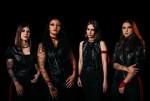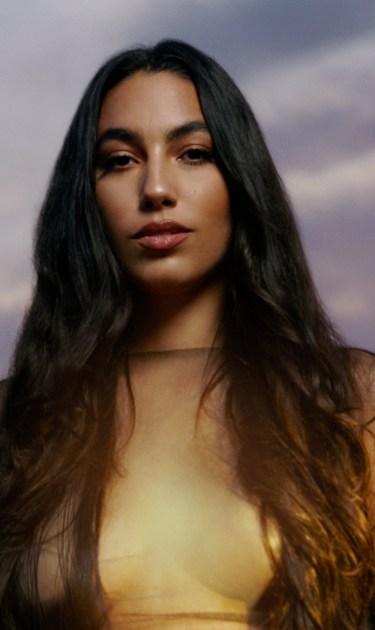María José Llergo, the rising flamenco star from Andalucía, Spain, is essentially a poet. She possesses the capability of using every experience of the world as raw material to sculpt something beautiful. Not a standard kind of beauty, but an ultra belleza, an energy of love. A natural-born performer, Llergo’s voice is always ready to tune the radio of her emotions. The sounds resonating through her body turn into words describing her feelings. “The things I think and feel sometimes are so big that it is hard for me to verbalize them. But when I can do it, I try my best to keep it as loyal as possible to the emotion,” she tells Remezcla from Barcelona. “Let’s say I’m on the train, and I describe what I see. [The train station] looks like a geometrical figure, and I am inside its edges. My intention is to bring what I see into a literary space. I enjoy that a lot.”
The other thing to keep in mind, she says, is that she comes from a land where poetry is abundant. “In Andalucía, everything is poetry. La Alhambra is poetry. The architecture. Flamenco is poetry made music. I am fortunate [that] I come from there,” Llergo explains.
Her latest album ULTRABELLEZA celebrates the diversity she witnessed and interacted with while touring Sanación, her 2020 EP. Traveling abroad for the first time, visiting New York and Rome, where the vision of La Fontana di Trevi moved her to tears, human gestures and works of art embraced her in awe.
“I came to the realization that I was being transformed by beauty. Defining that emotion, I came up with the concept of ULTRABELLEZA,” she says. “It allows me to enjoy everything and learn from everyone, and have lots of fun with other cultures. And never hate, only love.”

While traveling, she felt grateful for being able to make a living out of what she does best. For example, she wrote “Rueda, Rueda” in Montreal, a song that describes her journey going from her childhood in Pozoblanco to filling out venues located far from home with her electronica and R&B-influenced take on flamenco. In “Superpoder,” lyrics portray Llergo’s working-class family upbringing. The music video metaphorically shows how she grows to become a provider star, flying across the globe, spreading a light that brings the most arid deserts back into green, fertile life.
Unlike Sanación, which was more introspective, the tracks of the new album are sonically and lyrically a dialogue with the world. Or, as she describes it, chants of celebration and joy. “ULTRABELLEZA is a reflection of who I am. It is the outcome of my personal evolution,” she notes.
Llergo, now 29, started her formal vocal training nine years ago. A scholarship took her to the Escola Superior de Música de Catalunya in Barcelona. However, she’s been singing for as long as she can remember. During her childhood, her grandfather Pepe sang tangos, fandangos, and bulerías while opening furrows for the water to run in the garden.

“I copied his cantes and then transformed them,” she recalls. “I started to master my voice and learned to shape it so that it went in the direction I wanted, like the water went through the furrows my grandfather opened,” she says.
“In Andalucía, everything is poetry. La Alhambra is poetry. The architecture. Flamenco is poetry made music. I am fortunate [that] I come from there.”
In ULTRABELLEZA, Llergo uses that powerful mix of spontaneity and technique training of her voice to embody anthems celebrating all forms of love and defying sexist standards. “Lucha,” which came about from her writing sessions in London, reclaims women’s right to exist freely in the public space and reaffirms the strength of doing things “como una nena.” “Tanto Tiempo” queers up the classic bolero from Los Panchos, “Sabor a Mí,” reimagining it as the love story of a gay couple unable to love each other in the last century because it wasn’t allowed in Spain. “Though their union was brief when they were young, they met again now that society has evolved,” she explains about lyrics. “After ‘tanto tiempo,’ they are free to love each other in peace.”
Updating flamenco’s sound to the streams of pop music is not new. Artists like Alejandro Sanz and the legendary Rosario, daughter of the great flamenco diva Lola Flores, cemented their careers by translating their Andalusian heritage into an internationally renowned and commercially successful pop product. No matter how much water from other genres they use to pour the flower of their flamenco feeling, the seed of it is still there in the intonation of the voice, the patterns of the harmonies, the drama of the stories, and in the mix of programmed beats with acoustic instruments like el cajón or las castañuelas. Moreover, flamenco also remains in what poet and Llergo’s favorite flamenco lyricist Federico García Lorca defined as “el duende.” The cantaoras who receive el duende’s visit on stage experience their performances suddenly go from average to ecstasy-provoking.

Excited about sharing her new music live in front of new audiences, Llergo affirms not being a stranger to el duende and hopes to receive her visit. She will start a new tour in Spain and will cross the Atlantic to visit New York, Los Angeles, and Miami in March. However, the thing with el duende is that she doesn’t come when you want it but when she wants it.
“El duende is the soul of flamenco,” Llergo explains. “Sometimes she comes, touches your shoulder, and makes you rise, sing better than ever, feel something that is not even yours, like you are a channel through which she passes to project herself onto the audience, like light projected through a crystal.”




